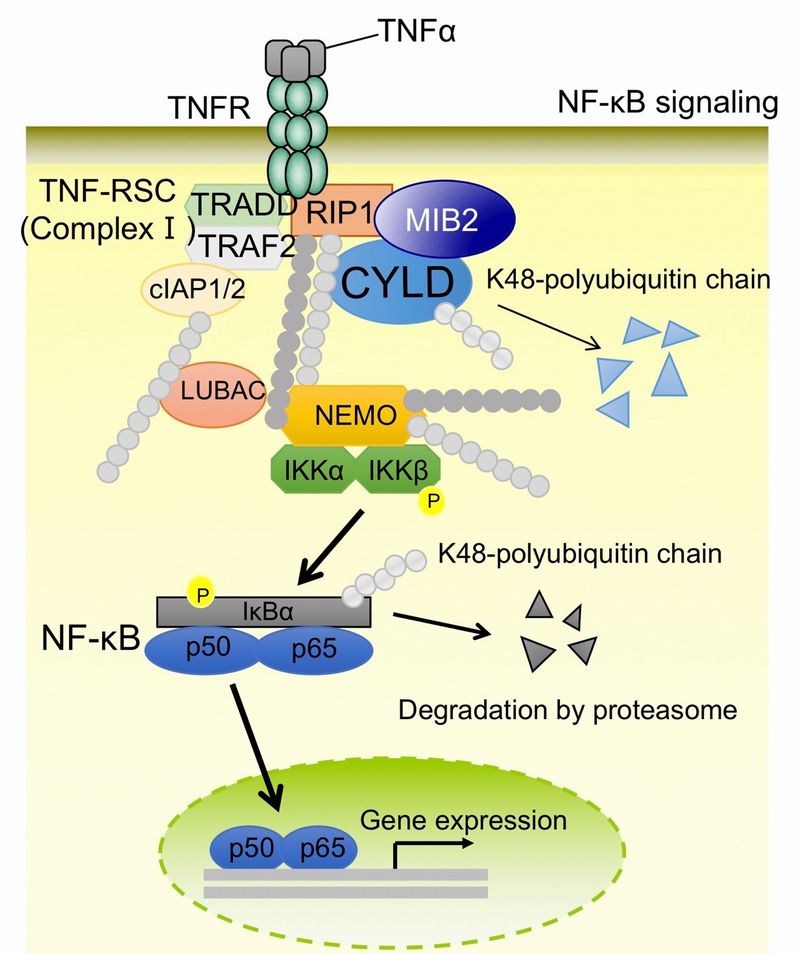E3 ubiquitin ligase MIB2 enhances inflammation by degrading the deubiquitinating enzyme CYLD
A team of researchers at Ehime University revealed that E3 ubiquitin ligase MIB2 enhances inflammation by degrading the deubiquitinating enzyme CYLD. This finding was published on September 20 in The Journal of Biological Chemistry.
The tumor suppressor CYLD lysine 63 deubiquitinase (CYLD) is a deubiquitinating enzyme that suppresses polyubiquitin-dependent signaling pathways, including the proinflammatory and cell growth-promoting NF-κB pathway. Missense mutations in the CYLD gene are present in individuals with syndromes such as multiple familial trichoepithelioma (MFT), but the pathogenic roles of these mutations remain unclear.
Recent studies have shown that CYLD interacts with a RING finger domain protein, mind bomb homologue 2 (MIB2), in the regulation of NOTCH signaling. However, whether or not MIB2 is an E3 ubiquitin ligase that acts on CYLD is unknown. Here, using the cell-free based AlphaScreen and pulldown assays to detect protein-protein interactions, along with immunofluorescence assays and murine Mib2-knockout cells and animals, we demonstrate that MIB2 promotes proteasomal degradation of CYLD and enhances NF-κB signaling.
Of note, arthritic inflammation was suppressed in Mib2-deficient mice. We further observed that the ankyrin repeat in MIB2 interacts with the third CAP domain in CYLD and that MIB2 catalyzes Lys48-linked polyubiquitination of CYLD at Lys-338 and Lys-530. MIB2-dependent CYLD degradation activated NF-κB signaling via tumor necrosis factor alpha (TNF-α) stimulation and the linear ubiquitination assembly complex (LUBAC). Mib2-knockout mice had reduced serum interleukin-6 (IL-6) and exhibited suppressed inflammatory responses in the K/BxN serum-transfer arthritis model.
Interestingly, MIB2 significantly enhanced the degradation of a CYLDP904L variant identified in an individual with MFT, although the molecular pathogenesis of the disease was not clarified here. Together, these results suggest that MIB2 enhances NF-κB signaling in inflammation by promoting the ubiquitin-dependent degradation of CYLD.
Reference URL: http://www.jbc.org/content/294/38/14135.long
Bibliographic Information
The E3 ubiquitin ligase MIB2 enhances inflammation by degrading the deubiquitinating enzyme CYLD. Atsushi Uematsu, Kohki Kido, Hirotaka Takahashi, Chikako Takahashi, Yuta Yanagihara, Noritaka Saeki, Shuhei Yoshida, Masashi Maekawa, Mamoru Honda, Tsutomu Kai, Kouhei Shimizu, Shigeki Higashiyama, Yuuki Imai, Fuminori Tokunaga, Tatsuya Sawasaki, The Journal of Biological Chemistry, 294, 14135-14148, doi:10.1074/jbc.RA119.010119, 2019 (September 20)
Fundings
- The Platform Project for Supporting Drug Discovery and Life Science Research (to T.S.) (Basis for Supporting Innovative Drug Discovery and Life Science Research [BINDS]) from the Japan Agency for Medical Research and Development (AMED) under the grant numbers 19am0101077
- a Grant-in-Aid for Scientific Research on Innovative Areas the grant numbers JP25117719 and JP16H06579 from the Ministry of Education, Culture, Sports, Science and Technology, Japan (MEXT)
- a Grant-in-Aid for JSPS Research Fellow (JP15J03774) from Japan Society for the Promotion of Science (JSPS)
- JSPS KAKENHI Grant Numbers JP15J03774, JP16K18570, JP16H04729, and 19H03218
- Takeda Science Foundation
Media
Contact Person
Name : Tatsuya Sawasaki
Phone : +81-89-9278530
E-mail : sawasaki@ehime-u.ac.jp
Affiliation : Proteo-Science Center (PROS)


